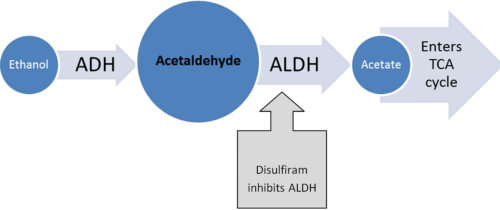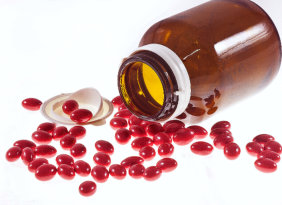Disulfiram-Alcohol Reaction
Disulfiram-Alcohol Reaction (DER) and Disulfiram-like reaction
Disulfiram (sold in the market as Antabuse) is a medication used to treat alcohol use disorder (AUD) by creating an unpleasant reaction when a patient drinks alcohol. Disulfiram is a non-competitive inhibitor of ALDH2, so patients being treated with disulfiram experience a temporary ALDH2 deficiency.
When patients are being treated with disulfiram consume ethanol, the acetaldehyde concentration in their blood will be significantly higher (normal metabolism of acetaldehyde is disrupted), resulting in acetaldehyde poisoning or disulfiram-alcohol reaction (DER).

DER could be life-threatening. Severe reaction includes flushing, throbbing headache, respiratory difficulty, nausea, vomiting, sweating, chest pain, palpitation, dyspnea, hyperventilation, tachycardia, hypotension, syncope, marked uneasiness, weakness, vertigo, blurred vision, and confusion. Severe reactions can involve respiratory depression, cardiovascular collapse, arrhythmias, myocardial infarction, acute congestive heart failure, unconsciousness, convulsions, and death. (Disulfiram label). Treatment of DER would make therapy with disulfiram much safer allowing development of a long-lasting form of this therapy.
DER symptoms begin to occur within 15-30 minutes of ethanol ingestion, with peak effects occurring within 8-12 hours (Soghoian. 2013 (1)). Due to the time range for peak effect all patients would have time and motivation to seek medical care. With the first symptoms of DER, which are very unpleasant, patients would stop drinking, so the dose of ethanol consumed will not likely be large. All patients who take disulfiram know DER symptoms, as fear of the reaction is one of disulfiram’s main mechanisms of action.
Administration of ALDH2 will be very effective to treat deficiency of the ALDH2 enzyme caused by side effect medications that inhibit ALDH2 enzyme so-called disulfiram-like reaction.

Alcohol-drug Interactions or disulfiram-like reaction:
Beyond disulfiram, a number of other medications also inhibit ALDH2. When taken in conjunction with recreational alcohol, these medications produce symptoms similar to those caused DER (this is known as disulfiram-like reaction).
The following are commonly used medications that cause disulfiram-like reaction when patients consume alcohol:
| Type of Medication | Generic | Brand Names |
|---|---|---|
| Analgesics (NSAIDs) | Phenacetin Phenylbutazone |
Various |
| Antibiotics | Cefamandole Cefoperazone Cefotetan Chloramphenicol Cefoperazone Cefotetan Griseofulvin Isoniazid Metronidazole Nitrofurantoin Sulfamethoxazole Sulfisoxazole |
Mandol Cefobid Cefotan Various Cefobid Cefotan Fulvicin, Grifulvin, Grisactin Nydrazid, Rifamate, Rifater Flagyl Furadantin, Macrodantin Bactrim, Septra Pediazole |
| Cardiovascular medications | Isosorbide dinitrate Nitroglycerin |
Dilatrate, Isordil, Sorbitrate (nitrates) Nitro-Bid, Nitrostat |
| Diabetes medications | Chlorpropamide Glyburide Tolazamide Tolbutamide |
Diabinese (sulfonylureas) DiaBeta, Glynase, Micronase Generic Generic |
